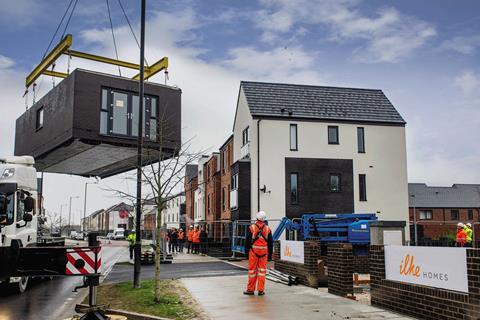Creditors of failed modular housebuilder Ilke Homes are owed a combined £321m – but the vast majority are not expected to receive a penny back.
According to a liquidators’ progress report for the year to 17 September 2024, Homes England is the only organisation that can expect to recover any cash.
The government’s housing and regeneration agency was owed £69m by Ilke, as a result of debentures granted in 2019 and 2021. But it is only expected to get £128,423 of that back – around 2% of the total it is owed.

Ilke sank last year after five years in business
This amount will come solely from money recouped from the sale of plant and machinery that has happened since Ilke went under last year.
Over the summer, an administrators report had predicted Homes England would recoup around £5m.
Ilke’s other creditors can expect to receive nothing, according to the report filed last week at Companies House by Alix Partners.
Ordinary preferential creditors, which include staff owed holiday pay, are owed a combined £734,614, while HMRC, classed as a preferential secondary creditor, is owed a further £2.2m. But it is unsecured creditors who are missing the most with this group owed £249m between them.
Ilke went into liquidation in October 2023 after going into administration four month earlier, with the majority of Ilke’s 1,150 employees made redundant straight away.
Debts owed by the company are understood to include money owed in equity to its investors, which included TDR Capital, Sun Capital and Fortress Investment Group, among others.
>> Read more: What went wrong for Ilke Homes?
Set up in 2018, the North Yorkshire-based business expanded rapidly, establishing regional offices in London, Birmingham and Bristol.
In 2021, it took on a further 500 staff after securing £60m of funding, despite posting significant losses the previous year.
In December 2022, it secured £100m in funding from the aforementioned group of investors, to expand production to 4,000 homes per year and create 1,000 additional jobs.
But at the start of last June, investors told the company they were pulling funding due to concerns over the rate of cash burn, which prompted an immediate halt in production and the start of an urgent sale process, which ultimately came to nothing.

